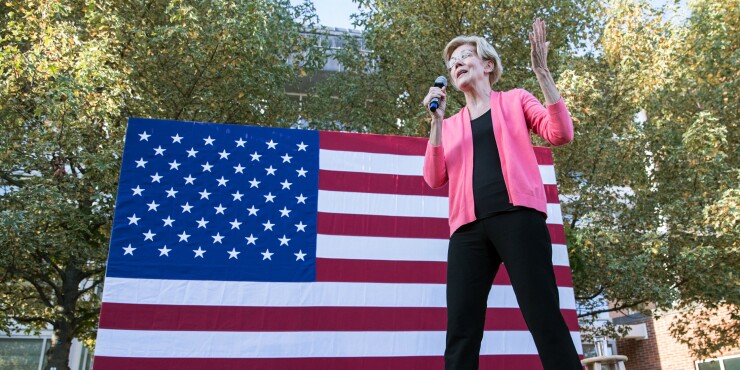Elizabeth Warren on Wednesday unveiled details of her proposed tax on lobbying that would cost some of the biggest U.S. corporations hundreds of millions of dollars.
Companies that spend between $500,000 and $1 million a year on lobbying would pay a 35 percent tax on their expenditures, according to her plan. The rate would increase to 60 percent for spending of more than $1 million, and to 75 percent above $5 million.
Warren, a Democratic presidential candidate and Massachusetts senator, has made fighting the influence of corporations a centerpiece of her campaign. Last month, she proposed a broader anti-corruption plan that would would ban all lobbying for foreign entities and prohibit lobbyists from donating to -- or fundraising for -- political candidates.
“My new lobbying tax will make hiring armies of lobbyists significantly more expensive for the largest corporate influencers like Blue Cross Blue Shield, Boeing, and Comcast,” Warren wrote. “Sure, this may mean that some corporations and industry groups will choose to reduce their lobbying expenditures, raising less tax revenue down the road – but in that case, all the better.”
Her campaign said that if her tax had been in effect over the last 10 years, more than 1,600 corporations and lobbying groups would have had to pay about $10 billion in taxes.
Citing data from from the Center for Responsive Politics for 2009-2018, the campaign said the U.S. Chamber of Commerce, the biggest spender, would have paid $770 million in taxes on $1 billion in lobbying over that period; the National Association of Realtors would have paid $307 million on $425 million in lobbying.
General Electric Co., Boeing Co., AT&T Inc., the Business Roundtable and Comcast Corp. would have paid between $105 million and $129 million in taxes. The Pharmaceutical Research & Manufacturers of America and the American Hospital Association would have all paid between $149 and $163 million.
The revenue from the tax would be used to help Congress and other federal agencies “fight back” against corporations and industries, Warren said. Some of the money would go toward establishing a new Office of the Public Advocate.
Paul Miller, who runs a lobbying firm that disclosed more than $500,000 in lobbying revenue in 2018, said the tax would be unsustainable. “Small firms like mine would be out of business,” said Miller, who is also president of the National Institute for Lobbying and Ethics.
Miller’s ethics group has suggested expanding the definition of lobbying to cover more of those in Washington’s vast influence industry, but said Warren’s proposal was a “political gimmick” to punish big business that was unlikely to pass and would raise constitutional concerns.
“We have the right to petition our government,” Miller said. “Now you’re going to tell us you’re going to tax us for doing it?”
Warren had earlier proposed expanding the definition of a lobbyist to include “everyone who is paid to influence lawmakers.” She said she would restrict their ability to work in government, prohibit elected officials and senior appointees from becoming lobbyists, and bar large companies and banks from hiring top ex-government officials for at least four years.
She has also vowed to increase pay for congressional staffers as an incentive to attract and retain talented people in those positions.

The candidate, who is competing with Senator Bernie Sanders of Vermont for the progressive mantle among Democratic presidential contenders, laid out her vision for curbing the influence of the rich and powerful at a rally in New York’s Washington Square Park a few weeks ago.
She presented her plans for health care, climate change, gun control, college debt and helping the middle class, with an overarching message that corporate and government corruption are breaking America’s democracy.
President Barack Obama had also campaigned on promises to curb lobbying. He banned appointees from communicating with employees of their former agencies for two years after leaving government.
President Donald Trump ran on a promise to “drain the swamp,” and ordered all his appointees to sign a pledge to refrain from lobbying the agencies where they worked for five years, even though he selected lobbyists for top administration posts.
-- Misyrlena Egkolfopoulou, Bloomberg News





